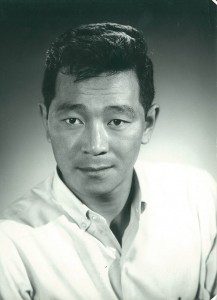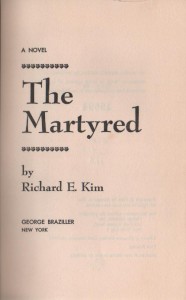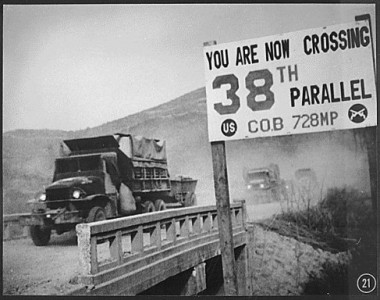Richard Kim Eunguk and The Martyred

Boston in the 1960s was briefly home to the famous Korean-American writer, Richard Kim Eunguk. His novel The Martyred (1964) was a very widely read and highly acclaimed book about the Korean War (1950-1953). He also wrote several other novels depicting life in Korea in the twentieth century.
Born in 1932 in Hamheung, North Korea, Kim’s whole family fled to South Korea right before the outbreak of the Korean War. Kim had just begun studying at Seoul National University when hostilities started. As North Korean forces moved south across the border, the United Nations first condemned the action, then called on member nations to provide the Republic of Korea with military assistance, and organized those forces under American command. Kim escaped Seoul, joined the U.N. forces, and from 1950 to 1954, he served in the South Korean military.
Right after his discharge, Kim had an opportunity to resume his education in the United States, and he accepted a scholarship from Middlebury College in Vermont in 1954. He studied there from 1955 to 1959 and then moved to Baltimore, Maryland, and earned an M.A. in writing at Johns Hopkins University in 1960. He once again moved to Iowa to earn an M.F.A. degree (1962) from the University of Iowa’s Writers Workshop, and there he began to write his first and most famous novel, The Martyred. He relocated to Boston to publish the novel while also studying at Harvard for a M.A. degree (1963) in Far Eastern Languages and Literature.

Perhaps due to public interest in Korea following the war, Kim’s book received worldwide attention and acclaim uncommon for most first novels. The Martyred remained on the New York Times bestseller list for over twenty consecutive weeks, and it was subsequently republished in ten different languages worldwide. By March 1964, it sold over 1,000 copies a day and was made into a play, an opera, and a film.[1] According to Yi Gihan, professor of English Literature at Myongji University, Pearl S. Buck, the famous author of The Good Earth, once said, “If this young man continues to do so well as this, he will someday be worthy of the Nobel Prize.”[2] True to Buck’s prediction, Kim was nominated for the Nobel Prize for literature in the early 1980s.
In fact,The Martyred was the first and only work by an Asian-American ever nominated for a Nobel Prize in Literature.[3] It was also nominated for a National Book Award, and Kim enjoyed national popularity, appearing in Newsweek and Life magazines.[4] He also received a Guggenheim Fellowship in 1966. Looking back on the popularity, Kim later said that “it was flattering and seductive, but also scary and unpleasant.”[5] This is understandable, since he literally became one of the most famous Koreans in the world overnight. Kim also received a National Endowment for the Arts Literary Fellowship (1978-79) for his creative writing.[6]

Most of The Martyred takes place in and around the North Korean capital of Pyeongyang, during the brief period in the fall of 1951 when U.N. forces held that city. The plot follows the investigation of a South Korean intelligence officer into the execution of twelve Korean Christian ministers by North Korean Communists in the opening days of the war. There is no doubt that Kim’s wartime experiences left an indelible mark on his consciousness and informed the writing of his book. He dedicated The Martyred “to the memory of Albert Camus, whose insight into ‘a strange form of love’ overcame for me the nihilism of the trenches and bunkers of Korea.”[7] With strong existentialist themes, the story deals with issues of human suffering, the meanings of truth, the human conscience, and the nature of good and evil. The novel addresses larger questions about Christianity itself as well, exploring issues of faith, hope, confession, martyrdom, and betrayal.
Kim’s second novel, The Innocent (1968), is a story about the military coup in Korea in 1961. His third, Lost Names (1970), is about Koreans during the Japanese occupation (1910-1945). It also earned warm critical acclaim and attention, but it was not the popular sensation of The Martyred. After 1970, Kim dedicated his energy to working in Korean and published a children’s book, A Blue Bird (1983), and a book of photographs, In Search of “Lost” Koreans in China and the Soviet Union: Photo-Essays(1989). He also taught in several schools including Long Beach State College, the University of Massachusetts at Amherst, Syracuse University, San Diego State University, and Seoul National University.
In June 23, 2009, Kim died at home in western Massachusetts where he lived from 1964 to 2009, leaving a significant mark in the history of Korean-American literature.
Citations
[1] Montye P. Fuse, “Richard E. Kim” in Asian American Autobiographers: A Bio-Bibliographical Critical Sourcebook, ed. Guiyou Huang (Westport, CT: Greenwood Press, 2001), 162.
[2] Yi Gihan, “The Martyred Revisited” in Journal of American Studies 35, no. 3 (Winter 2003), 161.
[3] Elaine H. Kim, “Korean American Literature,” in An Interethnic Companion to Asian American Literature, ed. Jeong King-Kok (New York: Cambridge University Press, 1997), 161.
[4] “Best-Selling Korean,” Life, March 20, 1964.
[5] In a 1993 interview, he said, “When The Martyred attracted all that attention, I learned about the writing game in this country – about agents, publicists, public relations, people, talk shows. It was flattering and seductive, but it was also scary and unpleasant.” Cited in Elaine H. Kim, 184.
[6] Fuse, 160.
[7] Richard E. Kim, The Martyred (New York: George Braziller, 1964), 7.
Written by: Hye Jin Lee
Edited by: Doug Tzan